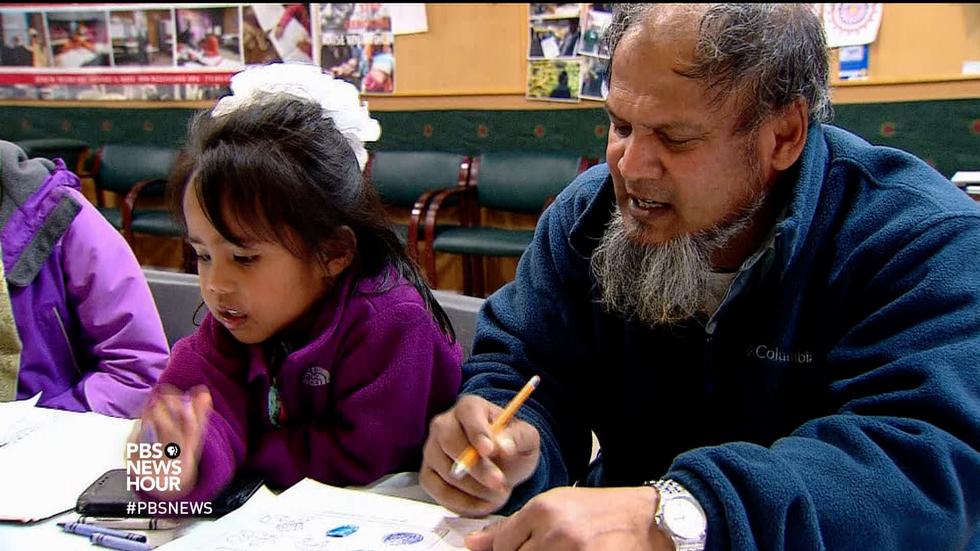(单词翻译:单击)
Hari Sreenivasan: Various refugee crises dominated news headlines this year, including Rohingyas, more than a million of whom have fled their homes in Myanmar.Many have ended up in camps in Bangladesh, but some have made it to the U.S., and the majority of those have settled in the Midwest part of the country.From PBS station WTTW in Chicago, Paris Schutz has the story of Rohingya refugees who have made Windy City their new home.
Paris Schutz: In many ways, Hasan is a typical Chicago high school student.The 14-year-old is the captain of his club soccer team.He attends Sullivan High School in Rogers Park, and has a close-knit group of friends.But Hasan's new life is the result of a harrowing escape from his home region of the Rakhine state in the country of Myanmar, formerly known asBurma.He says the Burmese military burned his village down, forcing him his family to flee for their lives.
Hasan: Like, Buddhists came to our country. And then they burned the house. They are killingthe Muslim people.
Paris Schutz: Hasan was taken in by a Rohingya family in Malaysia, before coming to the United States as a refugee. He says he has not seen or heard from his biological family since.
Hasan: I lost my whole family. We run. Wherever we go, we don't know.
Paris Schutz: And you just had to run off on your own?
Hasan: Yes, yes.
Paris Schutz: Hasan is one of dozens of Rohingya students in the Chicago public school system with similar stories. Nineteen-year-old Salamat says his parents arranged for his escape from Myanmar, but could not afford to leave themselves. Like Hasan, he came here with the help of the United Nations High Commission on Refugees. He worked at O'Hare and says he's sent all of his earnings back to his parents.
Salamat: I am just sending money to them, so I hope they will be safe.
Paris Schutz: He says he's able to talk to them online every day, and they are in constant fear of the Buddhist Burmese military, which has systematically forced Rohingya out of the country.
Salamat: They called us terrorists. And then they kill everyone, every children. They kill every woman. They fire into the home.
Paris Schutz: If Salamat and Hasan are dealing with the after-effects of post traumatic stress, it certainly doesn't show. Do you still struggle with everything that happened?
Hasan: Maybe not, because, sometimes, I think about my family. But here I can go to school, and then I can learn new things.
Paris Schutz: Sullivan High School has a large refugee population. Assistant principal Matt Fasana says administrators regularly care for kids who have experienced traumatic events.
Matt Fasana: And even the little things, like a kid is normally talking or trying or experiencing one day, and then all of a sudden isn't, that's a red flag.
Paris Schutz: Students can also get support at the Rohingya Culture Center on Devon Avenue. It bills itself as the only such center of its kind in the country.
Nasir Zakaria: We bring our culture here. Before, we don't have -- they take away our culture in Burma.
Paris Schutz: Nasir Zakaria is one more than 600,000 Rohingya that originally fled to Bangladesh. He then traveled to Thailand and Malaysia before coming to Chicago as a refugee. He says he landed a job as a dishwasher at Rivers Casino before becoming the full-time administrator of the culture center. He says there are few people that love and appreciate their new country more than the Rohingya. What is their life like in Chicago?
Nasir Zakaria: It's amazing. Life in Chicago, we are right now free.
Paris Schutz: The culture center says that there are around 1,500 Rohingya originally from Myanmar that are currently living in Chicago. They say that's the largest Rohingya populationof any city in the United States. The culture center offers free English classes and help assimilating to American life. But the optimism the Chicago Rohingya feel is counterbalanced bythe constant fear of what's happening in Myanmar.
Nasir Zakaria: I'm always every day, every time, I'm worried about my families. Today, they are alive. Tomorrow, I don't know if they are alive or not.
Paris Schutz: Nasir says the Rohingya have always had a tenuous relationship with the ruling Buddhist majority in Myanmar, but the conflict escalated in 2012. Now Rohingya are not recognized as citizens. Nasir says the Rohingya had hoped that the current leader, Aung San Suu Kyi, who is a former political prisoner that won the Nobel Peace Prize, would focus on human rights. But the plight of the Rohingya has only gotten worse under Suu Kyi, which hascaused widespread condemnation from world leaders, who describe it as ethnic cleansing.
Jan Schakowsky: Myanmar reviles them right now as not really legitimate people. They are stateless now, the largest group of stateless people in the world. People who live in Rakhine province are really held in essentially concentration camps.
Paris Schutz: Chicago Congresswoman Jan Schakowsky recently visited Myanmar and says the U.S. and U.N. need to pressure Suu Kyi to end the crisis. Nasir says Suu Kyi had enthusiastic support from the Rohingya, and she has let them down.
Nasir Zakaria: My heart is broken for her. From my heart, I want to say to her, she is liar number one. She don't have any justice.
Paris Schutz: For now, the Rohingya focus on building their lives in Chicago. Salamat says he wants to be a pilot one day. Hasan says he wants to continue to improve at soccer. All of the Rohingya students struggle to live a normal life with the specter of ethnic cleansing in their native country weighing heavily on their minds.
I'm Paris Schutz for the "PBS NewsHour" in Chicago.


